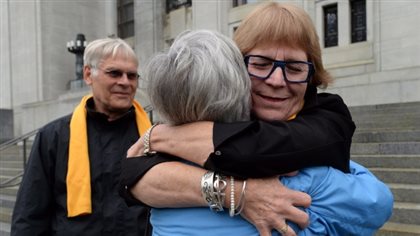In a landmark and unanimous 9-0 decision the Supreme Court ruled the Criminal Code laws prohibiting physician-assisted death infringes Section 7 of the Charter, which states that everyone has right to life, liberty and security of the person
The case was brought by the B.C. Civil Liberties Association on behalf of two women, Kay Carter and Gloria Taylor Both women had degenerative diseases and wanted the right to have a doctor help them die. Carter went to Switzerland with her daughter, Lee, to die. Taylor died of amyotrophic lateral sclerosis (ALS). Gloria Taylor has also since died.
The court ruled that the charter “right to life” doesn’t require an absolute prohibition on assistance in dying.
“This would create a ‘duty to live,’ rather than a ‘right to life,’ and would call into question the legality of any consent to the withdrawal or refusal of lifesaving or life-sustaining treatment,” the court wrote in the decision adding ”An individual’s choice about the end of her life is entitled to respect.”

The court also found an individual’s response to “a grievous and irremediable medical condition” is a matter critical to their dignity and autonomy. The law already allows palliative sedation, refusing artificial nutrition and hydration and refusing life-sustaining medical equipment.
“And, by leaving people … to endure intolerable suffering, it impinges on their security of the person,” the court wrote.
The court decision says in part, “Here, the prohibition deprives some individuals of life, as it has the effects of forcing some individuals to take their own lives prematurely, for fear that they would be incapable of doing so when they reached the point where suffering was intolerable”

Conditions include: – The person must be a competent adult who clearly consents to the termination of life;
– The person must have a “grievous and irremediable” medical condition, which includes an illness, disease or disability;
– The medical condition must cause “endless suffering” that is intolerable to the person, although that suffering can be physical or psychological.
The Supreme Court had originally looked into the issue in 1993 in the case of Sue Rodriguez, who suffered from ALS or Lou Gehrig’s disease, and wanted to end her own life.
Canada’s Criminal Code contatins sections which prevent people from consenting to their own deaths and/or allowing others to aid in their suicide. In a split decision, the court upheld the law in the Rodriquez case.
With the new ruling, those sections in the Criminal Code become null in 12 months.
In making the verdict today, Canada’s highest court found the breadth of the Charter of Rights and Freedoms has changed since the early 1990s. It also said the social landscape has evolved, because assisted dying is permitted in other places such as Belgium, Switzerland, and Oregon
By 2010, eight jurisdictions, including three American states, allowed doctor-assisted suicide. More jurisdictions have since allowed it, including Quebec, which last June passed its landmark end-of-life legislation albeit amidst great controversy.







For reasons beyond our control, and for an undetermined period of time, our comment section is now closed. However, our social networks remain open to your contributions.